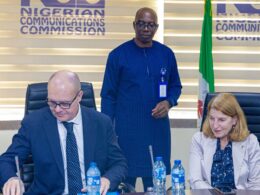In the gleaming halls of Lagos’ Eko Convention Centre last Friday, Nigeria witnessed what might be the telecommunications industry’s most desperate—and audacious—reinvention. 9mobile, Nigeria’s telecommunications company, has rebranded to T2, marking the third identity transformation in just 17 years for what was once the country’s most promising telecom upstart.
But this isn’t just another corporate rebrand. This is the story of a company that soared to greatness, crashed spectacularly, and now stands at the precipice of either resurrection or final collapse.
Chapter One: The Golden Beginning (2008-2016)
The story begins in 2008 when Etisalat Nigeria launched in 2008, backed by the UAE telecom giant’s deep pockets and cutting-edge technology. In Nigeria’s Wild West telecommunications landscape—where dropped calls were the norm and data speeds crawled—Etisalat arrived like a technological messiah.
The company’s rise was meteoric. It reached a peak of 22 million subscribers around 2014-2016, positioning itself as a formidable challenger to MTN’s dominance. Etisalat Nigeria wasn’t just selling phone services; it was selling reliability, innovation, and a glimpse of what Nigerian telecommunications could become.
Their marketing was slick, their network infrastructure superior, and their brand cachet unmatched. For millions of Nigerians, switching to the green network meant joining the telecommunications elite. Etisalat had cracked the code of Nigerian consumers’ desires: quality service wrapped in aspirational branding.
Chapter Two: The Great Collapse (2017)
But behind the glossy advertisements and impressive subscriber numbers, financial storm clouds were gathering. In March 2017, Nigeria’s telecoms regulator pushed for talks to halt takeover attempts by Etisalat creditors and reschedule its outstanding bln loan. The company was drowning in debt, and its UAE parent company was no longer willing to throw good money after bad.
The end came swiftly and brutally. In July 2017, Etisalat withdrew from the market after its debt was not repaid or rescheduled. Etisalat Group abandoned its 85% stake and exited its Nigerian operations, giving room for Emerging Markets Telecommunications Services, which previously owned 15% of the company to take over.
Overnight, 22 million subscribers woke up to discover their beloved Etisalat was gone, replaced by an unknown entity called 9mobile. It was corporate abandonment on a massive scale—a parent company walking away from its Nigerian child when the bills became too high.
Chapter Three: The Wilderness Years (2017-2024)
Rebranding to 9mobile in July 2017 was supposed to be a fresh start for the telco, but the new company faced two major challenges from the beginning. The most critical was infrastructure. Etisalat had operated under a managed service agreement with Huawei, but the Chinese tech giant’s relationship was with the UAE parent company, not the Nigerian subsidiary.
When Etisalat UAE walked away, so did much of the technical expertise and infrastructure support that had made the network reliable. The departure of initial investors led to financial difficulties and a decline in infrastructure, triggering a death spiral that would define 9mobile’s seven-year struggle.
The numbers tell a devastating story. By January 2025, its active user count had plunged to 3.2 million—a staggering 85% decline from its Etisalat peak. The rebranding from Etisalat Nigeria to 9mobile required a massive effort to re-establish its identity and regain market trust, but trust, once broken in Nigeria’s competitive telecom market, proved nearly impossible to rebuild.
The company became synonymous with poor network quality, dropped calls, and frustrated customers. Social media was awash with complaints about 9mobile’s service deterioration. What had once been Nigeria’s premium telecom brand became a cautionary tale about what happens when foreign investors abandon their African ventures.
Chapter Four: The Last Roll of the Dice (2024-2025)
By 2024, 9mobile was Nigeria’s smallest network operator, hemorrhaging subscribers and struggling to maintain basic services. Nigeria’s smallest mobile network operator 9Mobile has been taken over, a move that feels like a last-ditch attempt to improve its fortunes.
The unveiling ceremony, which held on Friday at the Eko Convention Centre, Lagos, came one year after LH Telecommunication Limited acquired a 95.5 per cent stake in the company. The new owners understood that 9mobile’s brand had become toxic—too associated with decline and disappointment to inspire consumer confidence.
Enter T2: Telecom company, 9mobile officially rebranded as T2 on Friday, unveiling plans to position itself as a digital-first telecom operator. The name itself is symbolic—T2 suggests technology squared, a doubling down on digital innovation that the company desperately needs to differentiate itself.
The Rebrand Strategy: Bold Moves and Big Promises
The rebrand, which includes a shift from the traditional telecom model to a digital-first approach, represents more than cosmetic changes. Nigeria’s fourth-largest telecom company, 9Mobile, has rebranded to a T2, with a fresh identity and promise of a better service amid prolonged network outages.
The company is betting everything on a fundamental shift in positioning. Where 9mobile was seen as a struggling traditional telecom operator, T2 wants to be perceived as a digital-native technology company that happens to provide telecom services. It’s a risky strategy—essentially asking Nigerian consumers to forget seven years of poor service based on a promise of digital transformation.
The move to rebrand as T2 is part of an intentional strategy to stabilise operations and restore market confidence. But the company faces the Herculean task of rebuilding infrastructure, customer trust, and market share simultaneously.
The Harsh Realities
The T2 transformation faces enormous challenges. 9mobile faces intense competition from other major players who continue to invest heavily in network expansion and service diversification. MTN, Airtel, and Glo haven’t stood still during 9mobile’s wilderness years—they’ve expanded their networks, improved their services, and captured the subscribers that 9mobile lost.
Moreover, the company has faced challenges related to regulatory changes and economic fluctuations, which can impact operational stability. Nigeria’s telecommunications landscape has become increasingly complex, with new regulations around data privacy, spectrum allocation, and foreign investment that require significant resources to navigate.
The subscriber exodus tells its own story. Losing 85% of your customer base isn’t just about poor service—it’s about broken trust, failed promises, and the kind of reputation damage that takes decades to repair. Nigerian consumers have long memories, especially when it comes to service providers who have let them down.
A Glimmer of Hope?
Yet there are reasons for cautious optimism in T2’s strategy. A recent national roaming agreement with MTN Nigeria aims to revitalise the company by expanding coverage and improving service quality. This partnership could address T2’s most fundamental problem—network coverage—by leveraging MTN’s superior infrastructure.
The digital-first positioning also aligns with broader trends in African telecommunications, where traditional voice and SMS services are giving way to data-centric offerings, fintech integration, and value-added services. If T2 can execute on this vision, they might find a profitable niche serving Nigeria’s increasingly digital-savvy consumers.
The Verdict: Resurrection or Final Act?
Once launched as Etisalat Nigeria in 2008, the operator now enters its third identity in 17 years—a level of brand instability that would destroy most companies. But telecommunications in Nigeria has always been about survival of the most adaptive.
The T2 rebrand represents either the final chapter of a company that refused to die quietly, or the beginning of one of Africa’s most remarkable corporate comebacks. The company that once dominated Nigerian telecommunications with 22 million subscribers is now fighting for relevance with barely 3 million.
In the unforgiving arena of Nigerian telecommunications, T2 has perhaps 18 months to prove that its transformation is more than marketing spin. Nigerian consumers will be watching, but they won’t be patient. They’ve been burned before by promises of better service and digital innovation.
The story of Etisalat to 9mobile to T2 is ultimately a story about the challenges of building sustainable businesses in Africa’s most dynamic market. It’s about the perils of foreign investment withdrawal, the difficulty of infrastructure rebuilding, and the unforgiving nature of consumer trust once broken.
Whether T2’s rebrand will be remembered as a brilliant turnaround or the final desperate act of a dying company remains to be written. But in a country where MTN and Airtel seem untouchable, even the attempt at such audacious reinvention deserves recognition.
The telecommunications game in Nigeria has never been for the faint of heart. T2 is about to discover if they still have the stomach for the fight.












